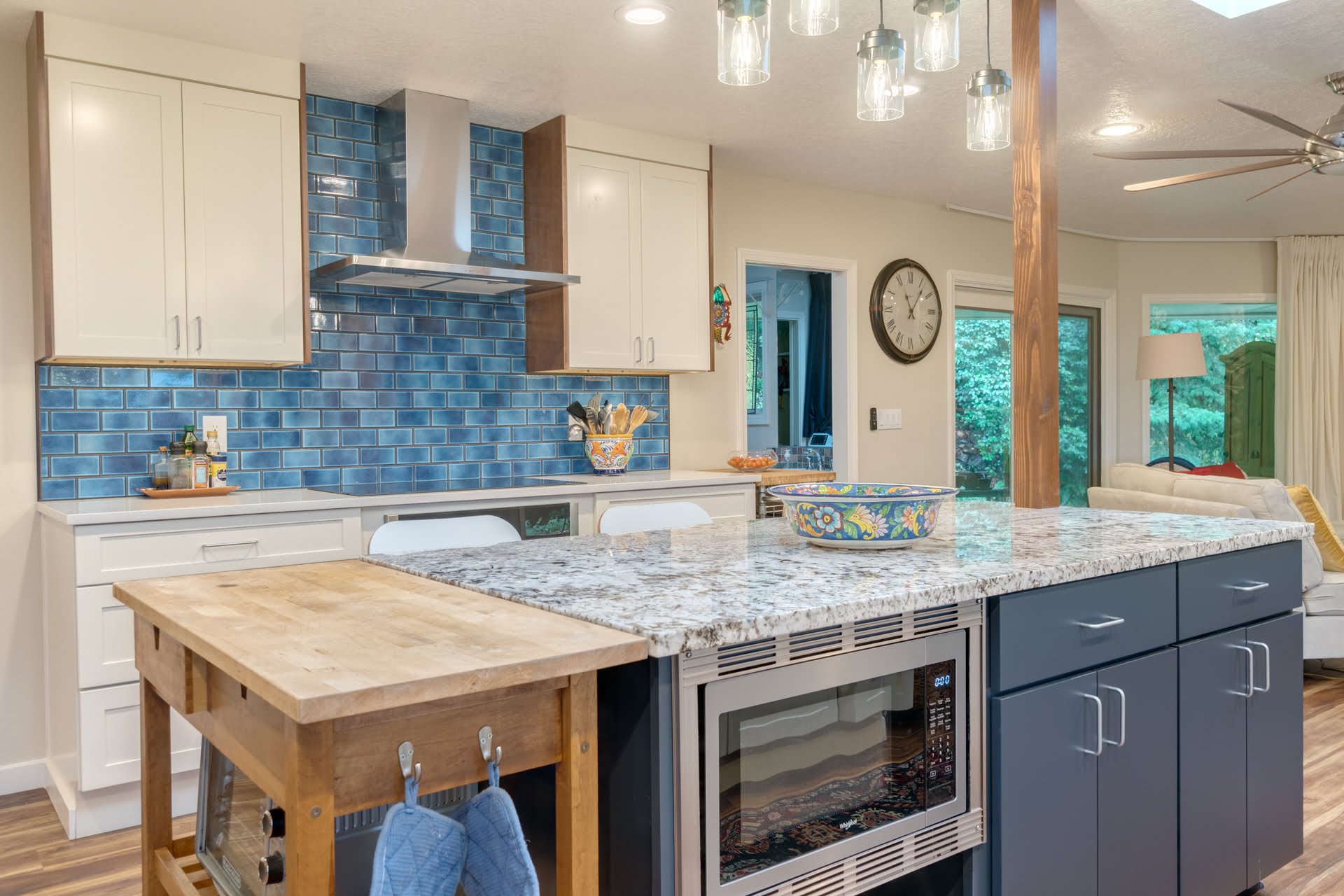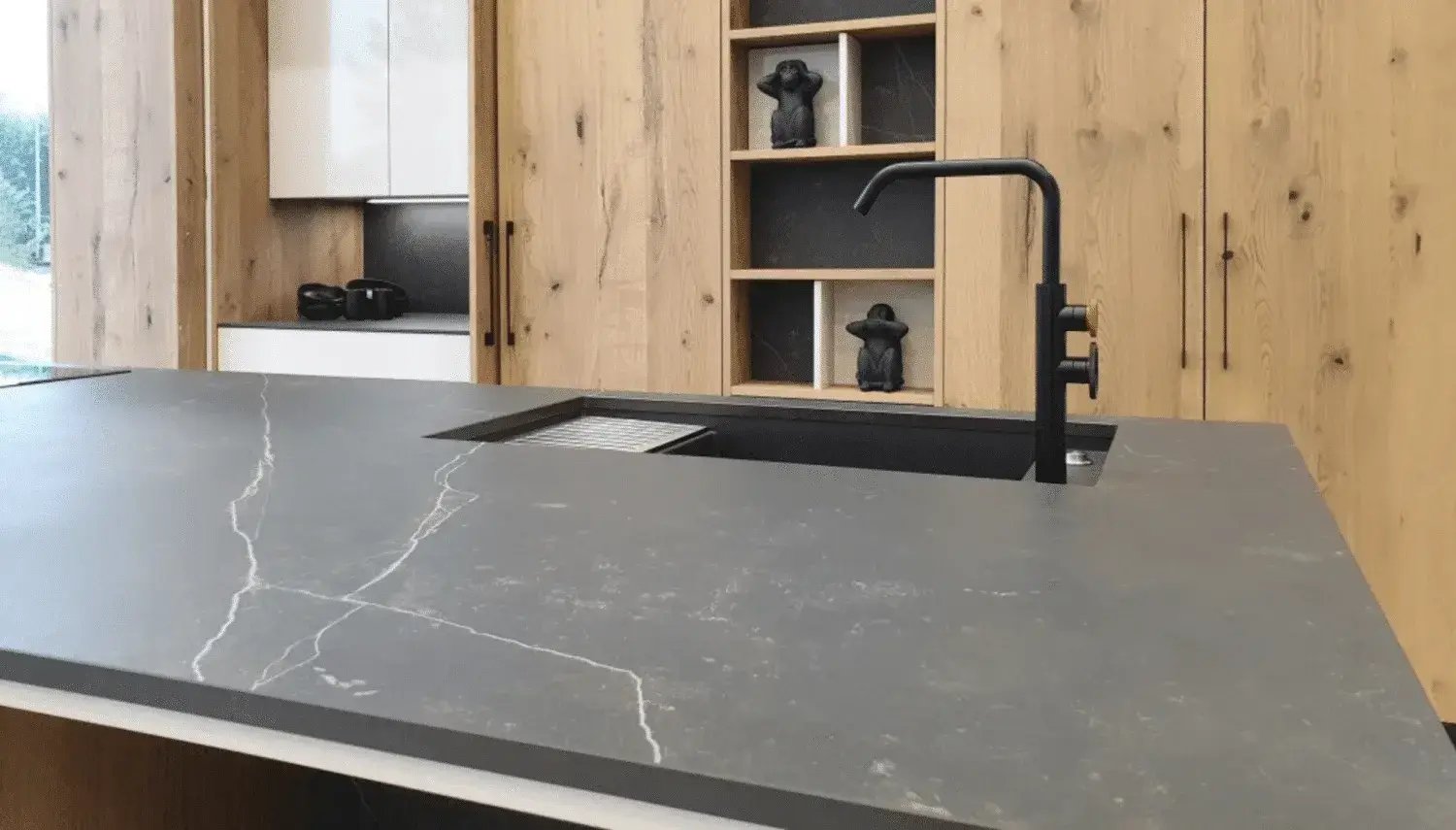When planning a kitchen remodel, the material you choose for your countertops can have a tremendous impact on the style, functionality, and durability of your kitchen. Among the many options available, granite and Dekton stand out as two popular choices. Both come with their own unique appeal and set of benefits. Understanding the difference between granite and Dekton can help you better understand how to fulfill your needs as you plan to renovate your kitchen.
At Lamont Bros. Design & Construction, we understand the importance of choosing the right countertops. With years of experience in guiding homeowners through the intricate process of kitchen remodeling, our team members have extensive expertise in helping homeowners like you select the perfect materials that align with both lifestyle and design aspirations.
In this article, we’ll discuss the specific qualities of both granite and Dekton countertops. We’ll explore what sets each material apart, discuss their pros and cons, and compare them side-by-side to help you make an informed decision. Whether you’re leaning towards the natural elegance of Granite or the contemporary charm of Dekton, you can use this article to make an informed decision for your remodel. The specific topics we’ll cover include:
- Pros & Cons of Granite Countertops
- Pros & Cons of Dekton Countertops
- How to Choose Between Granite & Dekton
Granite Countertops: Nature’s Art in Your Kitchen
A hallmark of strength and beauty from the natural world, granite has long been a favored choice for kitchen countertops. Granite is a naturally occurring igneous rock formed within the earth’s crust. Mined from quarries worldwide, granite has been used in construction since ancient times.
The appeal of granite lies in its intricate patterns and a spectrum of colors, from earthy browns to vibrant blues. Each slab of granite is a piece of natural art, ensuring no two countertops are exactly alike. This uniqueness allows for a personalized touch in every kitchen.
Pros of Granite Countertops
- Durability: Granite stands the test of time. As a natural stone, it can last for decades when given proper care and maintenance.
- Unique Aesthetic: The natural patterns and colorations of granite slabs add an element of luxury and individuality to your kitchen.
- Home Value: Granite countertops are desirable for many homebuyers and can increase your home’s resale value.
- Flexible Cost: Although granite is considered a premium countertop material, its cost varies based on the quality and source of the slab, much like diamonds. As a result, buyers can often find granite countertops in a lower price range if they are willing to settle for a lower grade of stone.

Cons of Granite Countertops
- Regular Sealing Required: To maintain its lustrous look and prevent staining, granite requires periodic sealing.
- Prone to Staining: Because granite is a naturally occurring rock, its surface is porous. For this reason, granite can be prone to staining. Wine and coffee stains are common issues among lighter-colored granite countertops.
- Variability in Appearance: While its uniqueness is a pro, the variability in its appearance can also present some challenges. Matching slab patterns for larger kitchens can be time-consuming and expensive.
- Weight: Granite’s durability also comes with heaviness, which requires sturdy cabinet boxes to support its weight. The weight can also drive up the cost of installation, as it requires time and careful planning to maneuver the slab into place.
Dekton Countertops: Modern Engineering Meets Style
Dekton represents one of the latest engineered countertop materials, a testament to modern technological advancements in home improvement. This composite material is created by compressing a blend of raw materials used in glass, porcelain, and quartz surfaces. This process, known as sintering, mimics the metamorphic change that natural stone undergoes over thousands of years but accomplishes it at an accelerated pace. The outcome is a highly durable surface that combines the best attributes of its constituent materials.
The manufacturing process also allows for a predictable consistency in patterns and coloration, making Dekton ideal for homeowners who prefer a uniform look across their countertops. Its sleek, modern finish fits perfectly in contemporary kitchen designs, offering a wide range of colors and textures.
Pros of Dekton Countertops
- Heat Resistance: Dekton is the only kitchen countertop material that can withstand direct contact with hot pots and pans. In other words, you can set a hot pan from the stove directly on Dekton without damaging the surface.
- Uniform Appearance: Unlike natural stones, Dekton offers a consistent pattern and color, ideal for large kitchens where matching slab patterns across seams is necessary.
- Slim Profile Options: Dekton can be manufactured in varying thickness profiles, providing a sleek, modern aesthetic without compromising on durability. Its slim profile also means Dekton can be used as cladding for backsplash, accent walls, and even cabinet doors.
- Low Maintenance: Being non-porous, Dekton countertops are easy to clean and do not require regular sealing.
Cons of Dekton Countertops
- Limited Edge Profile Designs: Dekton’s manufacturing process limits the complexity of edge designs compared to materials like granite. The color veins and patterns do not extend through the entire slab, only the surface. The edges typically have a solid color without veining around the perimeter.
- Newer on the Market: As a relatively new product, Dekton doesn’t have the same historical track record as natural stones. Though at the forefront of cutting-edge countertop materials, it’s not as tried and tested as other materials like granite or quartz, which might be a consideration for some homeowners.
- Higher Cost: Unlike granite, Dekton is priced consistently by product color and finish rather than by grade. Since it’s manufactured, it doesn’t have the variations in quality that granite often does. As a result, Dekton consistently costs about the same as high-grade granite.
Choosing Between Granite and Dekton: Which Suits Your Needs?
When selecting between Granite and Dekton, consider your lifestyle, kitchen usage, and design preferences. Granite offers timeless beauty and robustness, ideal for those who appreciate natural aesthetics and are willing to maintain its beauty. Dekton, on the other hand, is perfect for homeowners seeking a modern, low-maintenance countertop solution.
Consider the following when choosing between granite and Dekton.
Aesthetic Appeal
Granite, with its naturally occurring patterns and wide color spectrum, offers a unique, luxurious aesthetic to each kitchen. In contrast, Dekton provides a more uniform and contemporary look, catering to modern design preferences. If you’re looking for a natural stone appearance, granite is hard to beat. If you’re looking for something more modern with greater design flexibility, Dekton might be the way to go.

Durability and Maintenance
Both materials are highly durable and resistant to heat. Granite, however, requires regular sealing to maintain its appearance and prevent staining, whereas Dekton’s non-porous surface makes it low maintenance and easy to clean. Additionally, Dekton has a higher heat resistance rating and can handle hot pots directly on its surface.
While both will last a lifetime, it’s important to consider how much care and maintenance you are willing to give your countertop.
Cost and Installation
Granite can offer more cost-effective options and is more widely available, but it demands careful installation due to its weight. However, most countertop installers are experienced installers when it comes to natural stone, so labor will be less expensive and easier to find.
Dekton on average costs more than granite, and is much more difficult to install. Because it is a newer product on the market, not all countertop installers are educated and qualified to install Dekton. You may end up paying more for labor due to the difficulty of installation.
Want to Learn More About Kitchen Remodeling?
Now that you understand the difference between granite and Dekton countertops, do you feel more confident in your understanding of the countertop options available to you? Take the next step in your kitchen remodeling journey by downloading our free Kitchen Remodel Buyer’s Guide. In it, you’ll find industry best practices and advice from remodeling experts to help you understand the kitchen remodeling process.
Want to talk directly with an experienced remodel designer? Click the button below to schedule a free design consultation with a member of our team. We’ll help you prepare for and navigate the process of remodeling so you can turn your current kitchen into the kitchen of your dreams.



